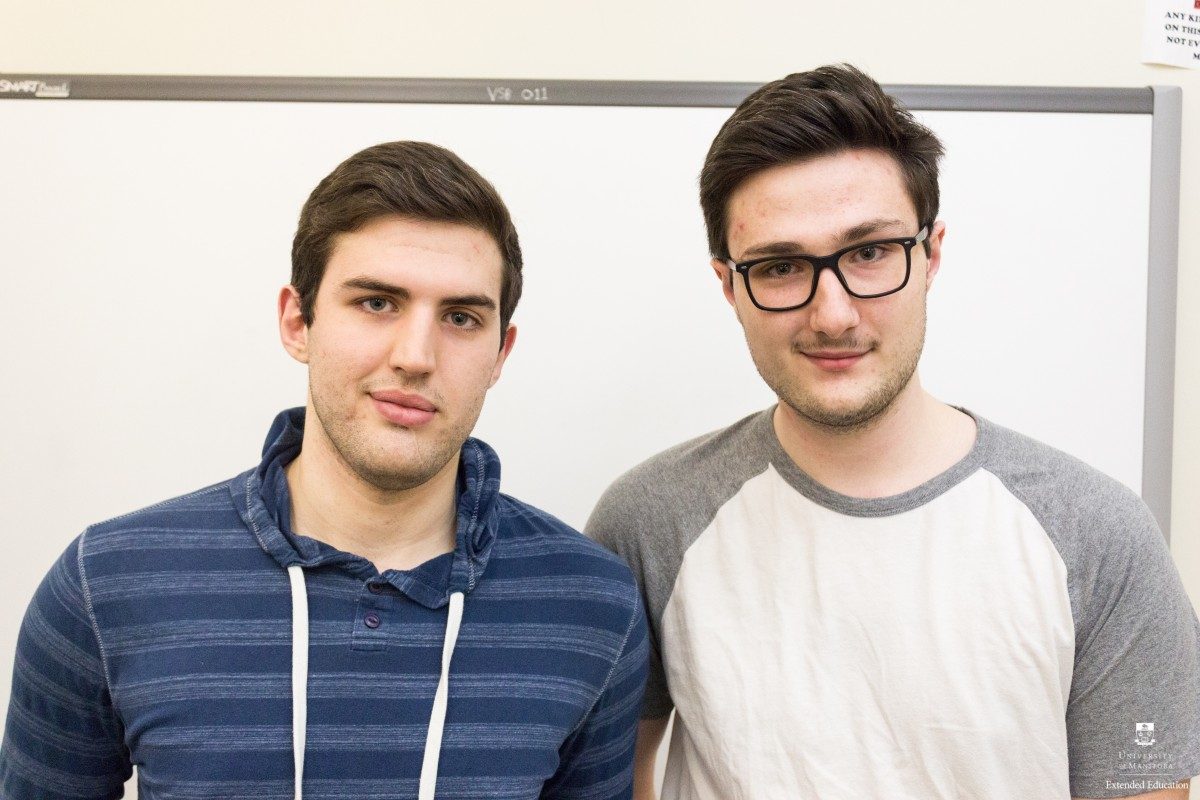
Curtis and Nicolas Leclair, Access Program students.
Métis brothers discover their path at the U of M
Students find direction with the Access Program
Brothers Nicolas and Curtis Leclerc found their cultural identity, confidence, career direction, and academic success in university with the support of the Access Program.
The Access Program at the University of Manitoba provides holistic support to Indigenous, newcomer, and other U of M students, empowering them on their path to success.
Now in his fourth year of kinesiology, Curtis remembers what it was like to come to the U of M as a new student. “The first year was insanely tough. I was living eight hours away from my family. Access became my family. The university has five times the population of our town. And, I spent my first two weeks on crutches because I had torn my ACL. Access took away my worries. It could have been a lot worse.”
As a university student, there are times when you might feel alone, and Access makes it a lot easier and less intimidating, he says. “They provide reassurance. You can come to university, work hard, and find something you love.”
See your potential
Curtis’s Access advisor could see his path and his potential before he did. “When I asked her about how to apply to medicine, she said she wondered when I would ask. She could see my direction before I could.”
Access counselling is an investment in you, says Curtis. “With Access, you have people to believe in you. My high school didn’t understand the potential in me. No one told me I had the potential to be more than I think I can be. They influenced the direction I am taking.”
With the support of the people at Access, Curtis did even better than he expected in his studies and built up his confidence.
“Access puts Northern students on a level playing field,” he says. “Many of the grads from our high school had never seen the university before. I was very stressed out at first. With Access counselling, I found a sense of calmness and created a confidence in me.”
Find out who you are
With Access, located in Migizii Agamik (Bald Eagle Lodge) on the U of M’s Fort Garry campus, Curtis also connected with the Indigenous community and learned more about his Métis culture and Indigenous cultural practices. “I had seen practices in The Pas, but I didn’t understand them. Here, I acknowledge their importance. It helps you to become an individual. You find out who you are.”
For Curtis, Access tutoring provided another reassuring support. “Knowing it is here for me, that support is available makes all the difference. Access feels like a second home. It makes the whole university experience a lot easier and less intimidating.”
Curtis told his brother, Nicolas about the Access Program. Nicolas always knew he should go to university, but the challenge of leaving his close-knit family and small Northern community seemed daunting, until he was reassured by his older brother and the Access Program.
“The transition was a hard one to overcome but they made it less scary,” says the second year science student from The Pas. “I always knew university was the way to go if I wanted a career and a good life.”
Be your own person
In The Pas, Nicolas was very close to his family, including his parents, twin brother Ben who is now studying engineering at the U of M, and older brother Curtis. “University is the first time I am living away from home. Here, I also like the idea of being my own person.”
For Nicolas, Access has also helped him find his path. He’s studying genetics, and plans to pursue graduate degrees and do research. “I had a passion for biology. I discovered microbiology and working in the lab is a joy. I want to help people through research.”
As an introvert, Nicolas says he doesn’t go out of his way to meet people. But with the events and activities at Access, he began to see many familiar faces and make new friends.
Access tutoring has also proved helpful, he says. “Students need to realize we don’t know everything. A half-hour of tutoring can help tremendously to raise your grades. If you don’t understand and can get someone to explain it to you, that’s massive.”
Nicolas also learned about Indigenous traditions, spirituality, and culture. “The practices are very powerful. They speak to a side of me.”
Although he did well in high school, Nicolas still found the transition to university to be a challenge. “They expect a lot more of me here.”
Curtis and Nicolas encourage Indigenous residents of Manitoba to apply to the Access Program, and attend the University of Manitoba.






